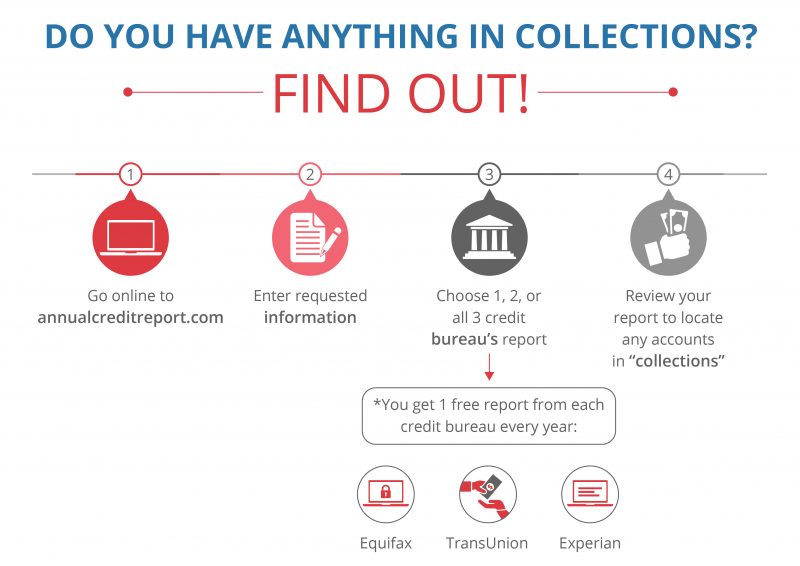- Lemberg Law
- FDCPA – Debt & Credit Complaints
- Debt Collection FAQ’s
- How to Find Out if You Have Anything in Collections
The easiest method of determining if you have a debt in collection is to check your credit report. Under the Fair Credit Reporting Act, you are entitled to an annual free copy of your credit report from each of the three major credit bureaus – Experian, TransUnion, and Equifax.
Finding your debt collectors
The easiest way to find out if you have anything in collections is to check your credit report. Obtaining your reports is a three-step process:
- Visit the official credit report site.
- Provide identifying information.
- Select which credit bureau report you’d like.
Section 612 of the Fair Credit Reporting Act (FCRA) mandates that each of the three major credit bureaus (Equifax, TransUnion, and Experian) provide you with a free copy of your credit report once every 12 months. To get started, visit www.annualcreditreport.com, the only website authorized by federal law to provide free credit reports. Then, select the option, “Request your free credit reports.” Next, complete the form by providing a variety of identifying information, including your name, date of birth, social security number, and address history for the last two years. If you are outside of the U.S., you must provide your permanent U.S. address or the credit bureaus will not be able to locate your information.
Then, select which of the three credit bureaus you would like to have generate your report. Don’t assume that each report has the same information. Some creditors report credit and debt information to only one bureau; others report to all three. Whether you should use up all three of your free reports at one time is a strategic decision. Ordering all three will give you a complete picture of the debts recorded as in collection. Ordering one every four months will allow you to keep track of your credit information over the course of a year.
When are you entitled to more than one free credit report?
You have a legal right to an additional free report, even if you have already obtained your free annual report, if one of these things is true:
- Within the last 60 days, you were rejected for credit, employment, or insurance due to your credit history.
- You are a victim of fraud or identity theft.
- You receive public assistance.
- You are unemployed and plan to apply for a job within the next 60 days.
If these circumstances do not apply to you and you have already used up your free credit reports for the year, an additional report will cost $12. Credit reporting agencies are legally prohibited from charging you more than $12 per credit report. Note that this does not include your credit score, which is generally not included with your credit report. Credit reporting agencies are allowed to charge an additional fee for your credit score.
Find out what debts you have in collection
Review your credit report and locate the section that lists debts that have been sent to collection. This section should be toward the bottom of your report. Each account will be listed, but remember that debt collection agencies are not obligated to report to every credit bureau. You may want to order reports from Experian, TransUnion, and Equifax to get a complete inventory of all debts listed on your credit reports as being in collection.
Lemberg Law’s debt collection harassment team has helped countless clients defend their rights against creditors who engage in unfair credit reporting practices. Contact us today at 844-685-9200 ☎ NOW or complete our online contact form for a no-cost, no-obligation consultation.
Have questions? Call us now at 855-301-2100 for a Free Case Evaluation.
Our services are absolutely FREE to you.
The harassing company pays our fees.
